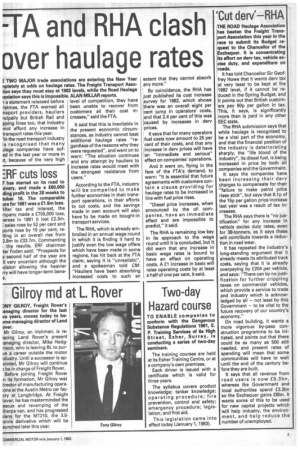'Cut derv'—RHA
Page 5

If you've noticed an error in this article please click here to report it so we can fix it.
1THE ROAD Haulage Association has beaten the Freight Transport Association this year in the race to submit its Budget request to the Chancellor of the Exchequer. Ft is concentrating its effort on dery tax, vehicle excise duty, and expenditure on roads.
It has told Chancellor Sir Geoffrey Howe that it wants dery tax at very least to be kept at the 1982 level, if it cannot be reduced in the Spring Budget, and it points out that British customers pay 60p per gallon in tax. This, it says, is significantly more than is paid in any other EEC state.
The RHA submission says that while haulage is recognised to be a vital part of the economy, and that the financial position of the industry is deteriorating sharply, the "life blood of the industry", its diesel fuel, is being increased in price by both oil companies and the Government.
It says the companies have been increasing their dery charges to compensate for their "failure to make petrol price rises stick", but says that 6.1p of the 15p per gallon price increase last year was a result of tax increases.
The RHA says there is "no justification" for any increase in vehicle excise duty rates, even for 38-tonners, as it says these will contribute towards a reduction in road wear.
It has repeated the industry's long-standing argument that it already meets its attributed track costs, saying that it is already overpaying by £204 per vehicle, and says: 'There can by no justification for further crippling taxes on commercial vehicles, which provide a service to trade and industry which is acknow.ledged by all — not least by this Government — to be vital to the future recovery of our country's .economy."
On road building, it wants a more vigorous by-pass con-struction programme to be initiated, and points out that there could be as many as 500 still meeded, and present rates of 'spending will mean that some communities will have to wait -until the end of the century before they are built.
It says that all revenue from 'road users is now £9.3bn, whereas the Government and local authorities spend £3.3bn so the Exchequer gains £6bn. It wants some of this to be used for new capital projects which will help industry, the environment, and help reduce the number of unemployed.
















































































